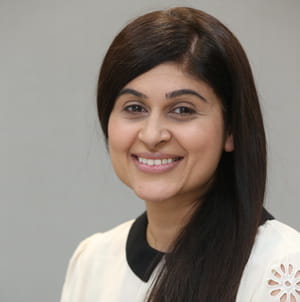
DR Roopinder Brar is a portfolio GP with a special interest in gynaecology. She qualified in 2010 from The University of Newcastle with a merit and gained her DRCOG (Diploma of the Royal College of Obstetrics and Gynaecology) while completing her training in general practice. She also has a Masters in Medical Law and Ethics from the University of Manchester and works as telephone adviser for MDDUS.
What attracted you to gynaecology?
I have always enjoyed gynaecology and was lucky enough to have very good teachers at medical school who made the subject interesting and easy to understand.
What do you enjoy most about your role?
Seeing women who often feel unable to speak to anyone else about their problems and being able to offer them solutions. It may be changing a method of contraception, treating a sexually transmitted infection, discussing their fertility or talking through HRT options. Exploring their feelings, discussing their options and hopefully being able to manage their symptoms does make the consultation very rewarding.
Are there any downsides?
Trying to do all of this in a 10 minute appointment! It simply isn’t enough time and I am constantly apologising to patients for running late. Thankfully, they are very understanding.
What do you find most challenging?
It can be difficult trying to manage expectations. Some patients are looking for a quick fix to their problem and these expectations can be difficult to manage. For example, when changing a method of contraception I always discuss the bleeding pattern with my patients. Some patients often call and return multiple times to discuss this very issue, expecting bleeding to have settled overnight. I do find that giving time to ask questions and explaining things clearly does help ease their mind.
What about the role has most surprised you?
It has to be the sheer demand for gynaecology advice and examinations. I find my appointments are booked up weeks in advance for both advice and assessments. Our patients have been very grateful that we have started a new weekly clinic just for seeing and speaking to patients about these issues and symptoms.
What is your most memorable experience so far?
I saw a lovely patient who did not speak English as her first language. She attended several times and it was clear that she was unable to explain that she needed contraception and something for her menorrhagia. She had four children and was keen to avoid another pregnancy. Her symptoms were making it difficult for her to go out and care for her children. With the use of an interpreter, we were able to find out what her concerns were – much to her relief. We discussed long-acting contraception, which would also manage her bleeding. I was able to give this patient the coil. It wasn’t a difficult consultation by any means. They coil was very easy to insert but the impact this had on her made it a very memorable consultation. She still hugs me every time she sees me.
What are the most common misconceptions about your job or about the specialty itself?
Patients who want to see a consultant gynaecologist, despite explaining that many gynaecological problems can be managed in primary care without input from our secondary care colleagues.
Describe a typical working week.
Busy. No two weeks are the same. I work four sessions. I am on call on Tuesdays, where literally anything and everything can walk through the door. I supervise the trainees, which is a great way of keeping up to date with all things non gynaecology. Even though the on-calls are busy, I enjoy being able to see a variety of patients with different medical complaints, of different ages, and the occasional man at some points! I have one session for routine patients and one session for my well woman clinic. Once a month I have a coil clinic too. I am on hand to advise about any gynaecology-related issues that I am skilled, trained and competent to advise on.
What are the tools and resources that you can’t live without in your day-to-day work?
I never start a women’s health clinic without my guidelines from the Faculty of Sexual and Reproductive Healthcare (FSRH), female anatomy diagrams, a contraception comparison chart with statistics, speculums of all sizes, gloves and access to a chaperone for intimate examinations.
What qualifications/training/experience are essential to your role?
DRCOG (Diploma of the Royal College of Obstetrics and Gynaeology) and DFSRH (DFSRH stands for Diploma of the Faculty of Sexual and Reproductive Healthcare) are essential qualifications. Good communication skills and being able to adapt are also essential – each patient is different and has different needs.
What opportunities are there for a GPwSI/GPER working in gynaecology?
I currently work in a GP surgery, where I also have the opportunity to teach other colleagues and trainees. I have colleagues working in hospital clinics as associate specialists in gynaecology and some in GUM (genitourinary medicine). There are plenty of opportunities available to work as GP with a special interest in women’s health.
Is there any advice you could give to a trainee GP considering a career in gynaecology?
General practice offers the opportunity to not only be a generalist but also, if you choose, to have a special interest. Patients appreciate having special clinics within the primary care setting and it allows GPs to focus on a branch of medicine that they may enjoy. Many practices would welcome a salaried GP/GP partner who is able to bring additional skills and services to their practice. Gynaecology gives the opportunity to develop practical skills too, such as inserting coils and implants. These consultations are rewarding and patients are often very grateful. Having a special interest in women’s health allows you to really lead and develop a service for the women of your area.
Opportunities for GPs in gynaecology
Making the decision to embark on specialist training in general practice can be agonising. Were you as a foundation year doctor passionate about one particular specialism or did you consider yourself a confirmed generalist? For many trainees the answer is rarely clear cut. Fortunately the medical profession has begun to recognise this and it is now becoming increasingly possible to do both.
A well-known GP “super-partnership” recently advertised for a gynaecology GP with an extended role (GPwER) providing sessions within a single practice but also working/training within a busy community gynaecology service. Such opportunities are likely to become more common as the NHS across the UK moves to more integrated primary and community health services.
Gynaecology is certain to be one of the core specialties in the RCGP launch of a new framework for GPs with an extended role (GPwER), which replaces the current designation of GPs with a special interest (GPwSI). Opportunities for GPs to develop an interest in OB/GYN are numerous, including the option to pursue a diploma from the Royal College of Obstetrics and Gynaecology (DRCOG) which is open to GP registrars in ST1/ST3, especially during O&G placements.
Find out more about the new RCGP framework.
This page was correct at the time of publication. Any guidance is intended as general guidance for members only. If you are a member and need specific advice relating to your own circumstances, please contact one of our advisers.
Read more from this issue of Insight Primary

Save this article
Save this article to a list of favourite articles which members can access in their account.
Save to library